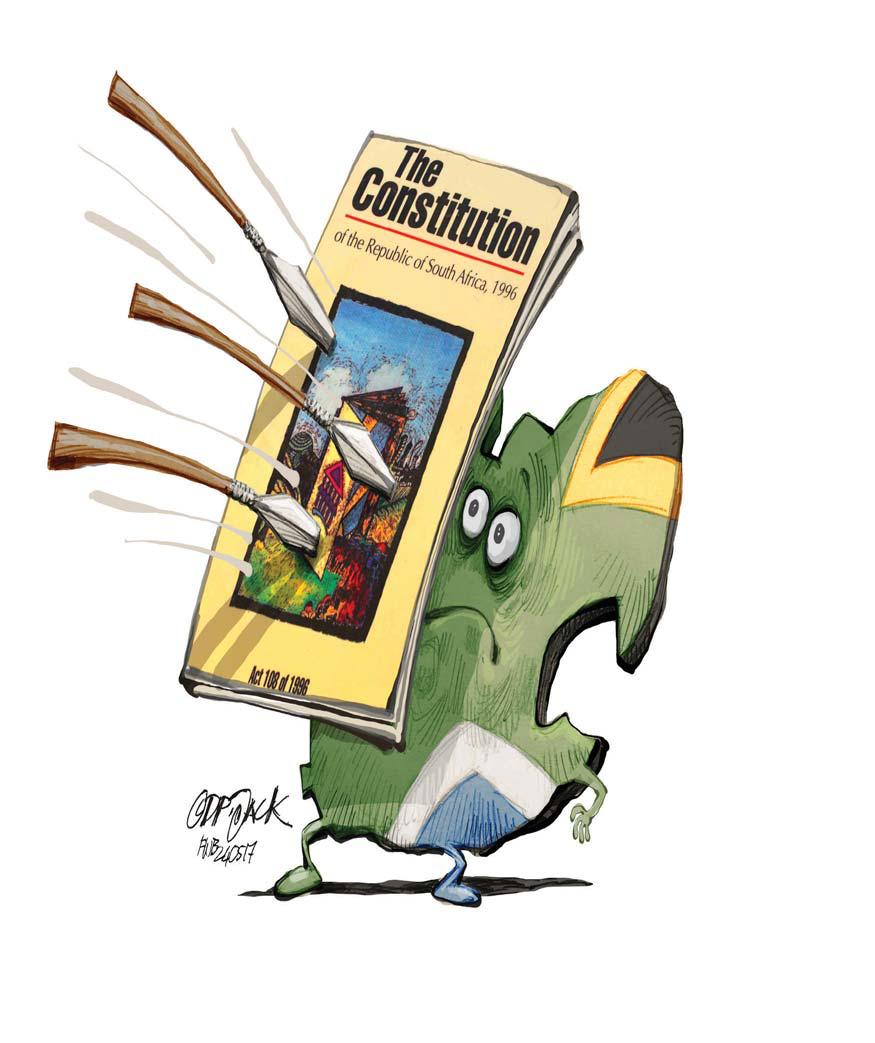
"There was a moment during the state-capture years of South African president Jacob Zuma’s term in office (2009 to 2018) when the veil finally slipped. There had been quiet rumblings against the country’s constitution for many years. But now a senior figure in the ruling African National Congress – its chief whip in the National Assembly, Mathole Motshekga – gave public expression to the notion that when judges overturned decisions of the government they were undermining democracy by thwarting the will of the majority.
As I watched a 2014 parliamentary ad hoc committee debate the Public Protector’s report on spending for Zuma’s private home, I realised that this might be a critical time for the notion of constitutionalism in modern South Africa.
The parliamentary committee’s work was to give effect to the findings and recommendations of the Public Protector.
If the view expressed by Motshekga – known in academic circles as the counter-majoritarian dilemma – were to gain wider currency, South Africa’s constitution would be weakened. Arguments in favour of a return to parliamentary sovereignty (of the apartheid era) might gain momentum. Without the checks and balances of the constitution, the scope for abuse of executive power would increase drastically. The human rights advances of the post-1994 era could be rolled back.
As I watched the proceedings of the ad hoc committee, I heard Motshekga ask why the views of the majority party in parliament should be subordinate to an unelected Public Protector.
His rhetorical question went to the heart of South Africa’s constitutional journey; it reflected how much the project to establish the principle of constitutionalism remained contested.
هذه القصة مأخوذة من طبعة 17 May 2024 من Farmer's Weekly.
ابدأ النسخة التجريبية المجانية من Magzter GOLD لمدة 7 أيام للوصول إلى آلاف القصص المتميزة المنسقة وأكثر من 9,000 مجلة وصحيفة.
بالفعل مشترك ? تسجيل الدخول
هذه القصة مأخوذة من طبعة 17 May 2024 من Farmer's Weekly.
ابدأ النسخة التجريبية المجانية من Magzter GOLD لمدة 7 أيام للوصول إلى آلاف القصص المتميزة المنسقة وأكثر من 9,000 مجلة وصحيفة.
بالفعل مشترك? تسجيل الدخول

New farmers' seedling pitfalls
Inexperienced farmers may be tempted to grow seedlings from seed themselves, but they have much to gain by trusting a seedling grower at a nursery to perform this task for them instead

South African avocado production: a success story
Avocado production in South Africa has expanded markedly since the industry's humble beginnings over 80 years ago. From a small grove planted in 1938 in what was then Nelspruit, the industry has blossomed to seven million trees planted on 20 000ha. Dr Guy Witney, project manager at Great Brak Avos, spoke to Annelie Coleman about the country's avocado production.

Unlocking value through livestock exports
Exporting livestock might sound like a daunting business that's better left for big companies, but Gerrie Ferreira, who farms near Oudtshoorn in the Western Cape, has been doing it successfully for almost 30 years, sometimes in partnership with other breeders. He spoke to Glenneis Kriel about the huge potential this market holds, and offers some advice for farmers who are contemplating going this route.

An agribusiness's dedication to community upliftment
For agribusiness NWK, located in Lichtenburg, North West, corporate social investment is an important part of creating a positive influence alongside financial returns. Johan Bezuidenhout, NWK’s group manager of corporate marketing and communication, spoke to Annelie Coleman about why the company chooses to invest millions of rands in the area it operates in every year.

Empowering dreams, transforming lives
Since its launch in 2013, the Agri's Got Talent competition has revolutionised the lives of many farmworkers by unlocking their hidden talents and fostering a culture of empowerment. Glenneis Kriel spoke to various finalists about how the contest has changed their lives.

Foreign investment: agriculture maintains its appeal
South Africa remains a popular destination for foreign investors, despite an often negative outlook from its citizens. It is a gateway to Africa, and with its counterseasonal production to the Northern Hemisphere and favourable weather, local agriculture is especially well placed to attract foreign interest, bringing with it hope for rural communities

The real value and message of COP29 for SA agriculture
While the 2024 Conference of the Parties may have disappointed those who hoped for real progress, it's more important for South African agriculture to highlight its role in carbon mitigation

Improving efficiencies in feed and grain milling
Bühler, a Swiss-based company that provides solutions and equipment for various industries, including food and animal feed processing, has pledged that by 2025, it will deliver scalable solutions that will reduce energy, waste and water by 50% in the value chains of its customers.

Tips for better olive production
At an SA Olive Association field day in November, industry experts shared ways to improve olive production efficiencies, from soil preparation to harvesting.

More effort needed to protect vulnerable cheetah
On International Cheetah Day, commemorated every year on 4 December, emphasis was placed on the vulnerability of the species.